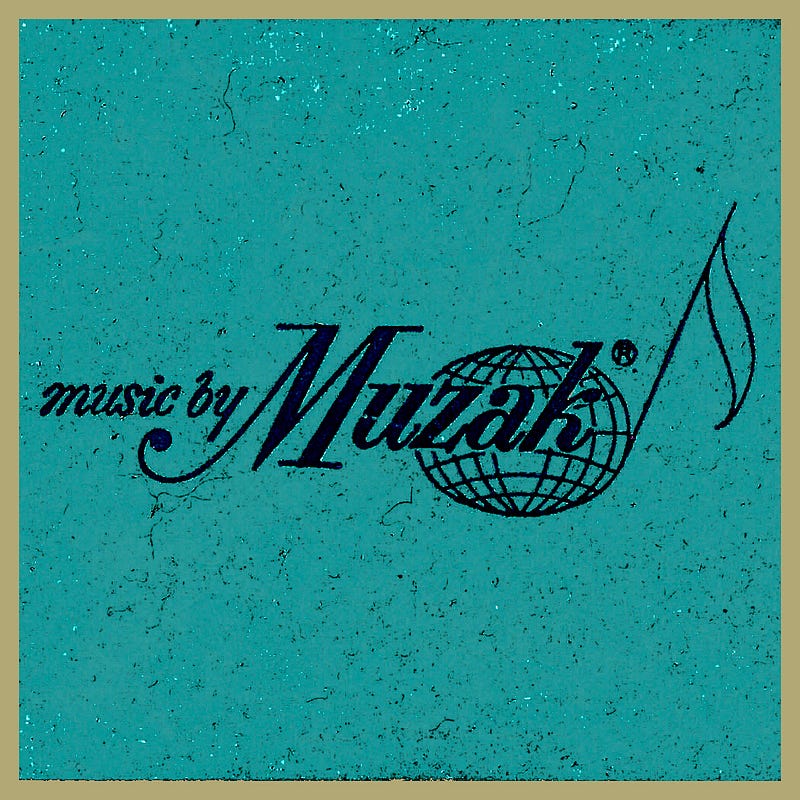Nostalgic Reflections on Muzak: A Journey Through Sound
Written on
Chapter 1: The Soundtrack of Waiting Rooms
There are three words I never expected to utter: "I miss Muzak."

(Source: Muzak Corporation)
While I can’t recall many childhood birthday celebrations, the memories of visits to the doctor remain vivid. This recollection largely stems from the omnipresence of Muzak. It served to ground you, reminding you of your surroundings and hinting that an unpleasant experience was imminent.
During the '70s and '80s, Muzak was inescapable. It filled the air in doctors' offices, dental clinics, grocery stores, pharmacies, and even elevators, all piped through unseen speakers. Much like the inevitability of death, it was beyond your control.
As time has passed, I've come to realize how much I miss Muzak. There was something oddly entertaining about trying to identify the songs in their poor, tinny renditions. It was a challenge to recognize tunes amidst the dull ambiance of dying rubber plants and the hushed voices of the unwell.
It’s astonishing to think that today’s youth aren't subjected to a dreary string cover of "Feelings" while flipping through a battered edition of Highlights for Children, which looked as if it had endured a toilet mishap before being returned to the waiting room table.
Currently, waiting rooms are universally equipped with flat-screen TVs broadcasting cable news or HGTV—anything is preferable to thumbing through a stale copy of People. There’s no need for Muzak anymore.
Moreover, smartphones have transformed our waiting experiences. Back in 1975, I would have traded anything for a smartphone while awaiting entry into that dreaded room where vaccinations were administered. It seems unbelievable, yet I’m certain I received at least one shot every year from the time I became conscious until high school. Such a staggering number of vaccinations!
Whyyyyy? Whyyyyy?
And why were those injections always administered in the hip? It’s been three decades since I've had a shot there, yet as a child, that was the only option. The procedure involved dropping your pants and turning around, followed by a paltry lollipop to ease the discomfort.
Chapter 2: The Origin of Muzak
I’ve often considered the term "muzak" to be a pejorative twist on the word "music," used to describe any bland instrumental background noise. It never occurred to me that this concept had an actual inventor who thoughtfully crafted the name.
Muzak was invented in 1920 by Major General George O. Squier, the Chief Signal Officer of the Army during World War I. Surprisingly, it was initially transmitted through electrical wiring into homes. I envision music emanating from light sockets, although I assume speakers were involved.
At that time, radios were not widely accessible, and people were likely desperate for any form of entertainment, even if it originated from kitchen appliances.
In 1934, General Squier established a company to distribute his invention, merging the words “music” and “Kodak”—another innovative company making waves at the time. Thus, Muzak was born, sold as original orchestrations to businesses, intended to bombard customers and distract elevator riders from the precarious nature of their ascent.
Section 2.1: Muzak and Productivity
During World War II, as industrial demands surged, efficiency experts discovered that workers performed better when exposed to Muzak. This led the Muzak company to patent a system called Stimulus Progression, which provided 15-minute loops of instrumental music that gradually increased in tempo and intensity. This technique created a subconscious sense of momentum, influencing the creation of spin classes in the 1980s.
Despite its questionable efficacy, the company endured, even surviving a hostile takeover attempt by Ted Nugent in 1986, who sought to dismantle it, deeming Muzak “uncool.”
Muzak Holdings was eventually acquired by Mood Media in 2011, which has since expanded its offerings to include ambient scents, as if that could save the brick-and-mortar experience from extinction.
Personally, I never found solace in Muzak. It evokes memories of harsh lighting and sterile spaces, reminding me of discomfort and reluctance. It takes me back to grocery stores with automatic doors and the scent of refrigerated meats, as well as medical facilities with wood paneling and indoor ashtrays.
If you're curious, here’s a collection of private Muzak tapes uploaded online—scratchy yet reminiscent of the sounds of yesteryear.
This one features Percy Faith, a nostalgic throwback that might just be what we need in today's chaotic world: less Post Malone and more Xavier Cugat.

Chapter 3: A New Soundscape
If you’re intrigued by the evolution of Muzak, check out another video reflecting on this theme:
Are we feeling soothed yet?